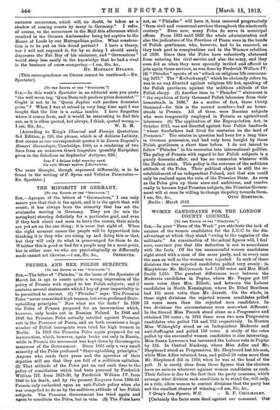PRUSSIA AND HER POLISH SUBJECTS.
[TO THE EDITOR OF THE " SPECTATOR.'
SIR,—The letter of " Pleiades," in the issue of the Spectator of March 1st, is apt to create quite a wrong impression of the policy of Prussia with regard to her Polish subjects ; and it contains several statements which I beg of your impartiality to be permitted to correct. (1) "Pleiades " says : The Prussian Poles "never committed high treason, but even professed State- upholding principles." Now what are the facts ? In 1830 the Poles of Prussia prepared for an insurrection which, however, only broke out in Russian Poland. In 1846 and 1848 the Prussian Poles actually rebelled against Prussian rule in the Province of Posen, and on both occasions a large number of Polish insurgents were tried for high treason in Berlin. In 1863 the Prussian Poles again prepared for an insurrection, which, however, again broke out only in Russia, while in Prussia the movement was kept down by the energetic measures of the Government. Since 1863 only a very small minority of the Poles professed " State-upholding principles." Anyone who reads their press and the speeches of their deputies will see that they are full of a seditious agitation. (2) That attitude of the Poles put an end each time to the policy of conciliation which had been pursued by Frederick William III. from 1815-30, by Frederick William IV. from 1840 to his death, and by the present Emperor from 1890-93. Prussia only embarked upon an anti-Polish policy when she was compelled to do so by the seditious attitude of her Polish subjects. The Prussian Government has tried again and again to conciliate the Poles, but in vain. (3) The Poles have not, as " Pleiades " will' have it, been removed progressively "from civil and communal services throughout the nineteenth century." Even now, many Poles do serve in municipal offices. From 1815 until 1830 the whole administration and also the judicature of the Province of Posen were in the hands of Polish gentlemen, who, however, had to be removed, as they took part in conspirations and in the Warsaw rebellion of 1830. Since then the Poles have voluntarily abstained from entering the civil service and also the army, and they even did so when they were specially invited and offered to join again those services, as was done by Frederick William (4) " Pleiades " speaks of an "attack on religious life commenc- ing 1872." The " KnIturkampf," which he obviously refers to, was in no way directed against religions life but, speaking of the Polish provinces, against the seditious attitude of the Polish clergy. (5) Another item in " Pleiades' " statement is " the expulsion of forty thousand Polish labourers from their homesteads in 1886." As a matter of fact, those thirty thousand—for this is the correct number—bad no home- steads in Prussia. All of them were Russian subjects who were temporarily employed in Prussia as agricultural labourers. (6) The application of the Expropriation Act, in October 1912, was not directed against four Polish landlords " whose forefathers had lived for centuries on the land of Posnania." The estates in question had been for a long time in German possession, and had only been bought by those Polish gentlemen a short time before. I do not intend to follow " Pleiades " in his excursion into international politics. The policy of Prussia with regard to her Polish subjects is a purely domestic affair, and has no connexion whatever with the Balkan crisis. This policy is the outcome of the seditious attitude of the Poles. Their political object is still the re- establishment of an independent Poland, and that aim could only be realized upon the ruin of the Prussian State. As soon as the Poles give up those aims and ambitions, and resolve really to become loyal Prussian subjects, the Prussian Govern- ment will at once be willing to change its policy towards them.














































 Previous page
Previous page